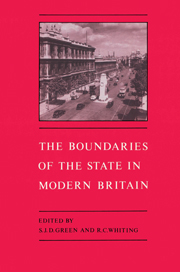Book contents
- Frontmatter
- Contents
- List of figures
- List of tables
- List of contributors
- Acknowledgements
- 1 Introduction: the shifting boundaries of the state in modern Britain
- Part I The state and political theory
- Part II The economy
- Part III Welfare and social policy
- Part IV Conflict and order
- Part V Religion and morality
- Index
1 - Introduction: the shifting boundaries of the state in modern Britain
Published online by Cambridge University Press: 18 March 2010
- Frontmatter
- Contents
- List of figures
- List of tables
- List of contributors
- Acknowledgements
- 1 Introduction: the shifting boundaries of the state in modern Britain
- Part I The state and political theory
- Part II The economy
- Part III Welfare and social policy
- Part IV Conflict and order
- Part V Religion and morality
- Index
Summary
The theme
One of the defining characteristics of twentieth-century British history has been the rise of the state. That we take to mean the transformation of the executive branch of government from a limited system of force into an extensive network of services, at once literally bigger, more self-consciously competent and altogether more intrusive – for good or ill – into the lives of its citizens than ever before. Whatever else can be said about it, this development has not passed unnoticed in our time. Lip-service is paid to it almost daily by politicians, journalists and even ordinary people. Academic colloquia are continually dedicated to its more sophisticated understanding. Books are written about it, often good books too. Studies in the history of government involvement in the organisation and management of Britain's post-war economy have multiplied, almost as this involvement has grown, during the past thirtyyears. Significant treatises on the rise of publicly managed social and welfare policy scarcely fall far behind. Similarly so for the transformation of political behaviour which these changes entail. Once neglected fields, such as investigation into the impact of, and alterationsin, the application of economic and social expertise in public and even private life now find their niche. And all the time, positive and normative theories of the state, especially the liberal state, and particularly the British liberal state, abound.
In such an over-crowded field, the appearance of yet another book on the state in modern Britain requires some justification. This lies, or strictly speaking begins, with its title.
- Type
- Chapter
- Information
- The Boundaries of the State in Modern Britain , pp. 1 - 12Publisher: Cambridge University PressPrint publication year: 1996



